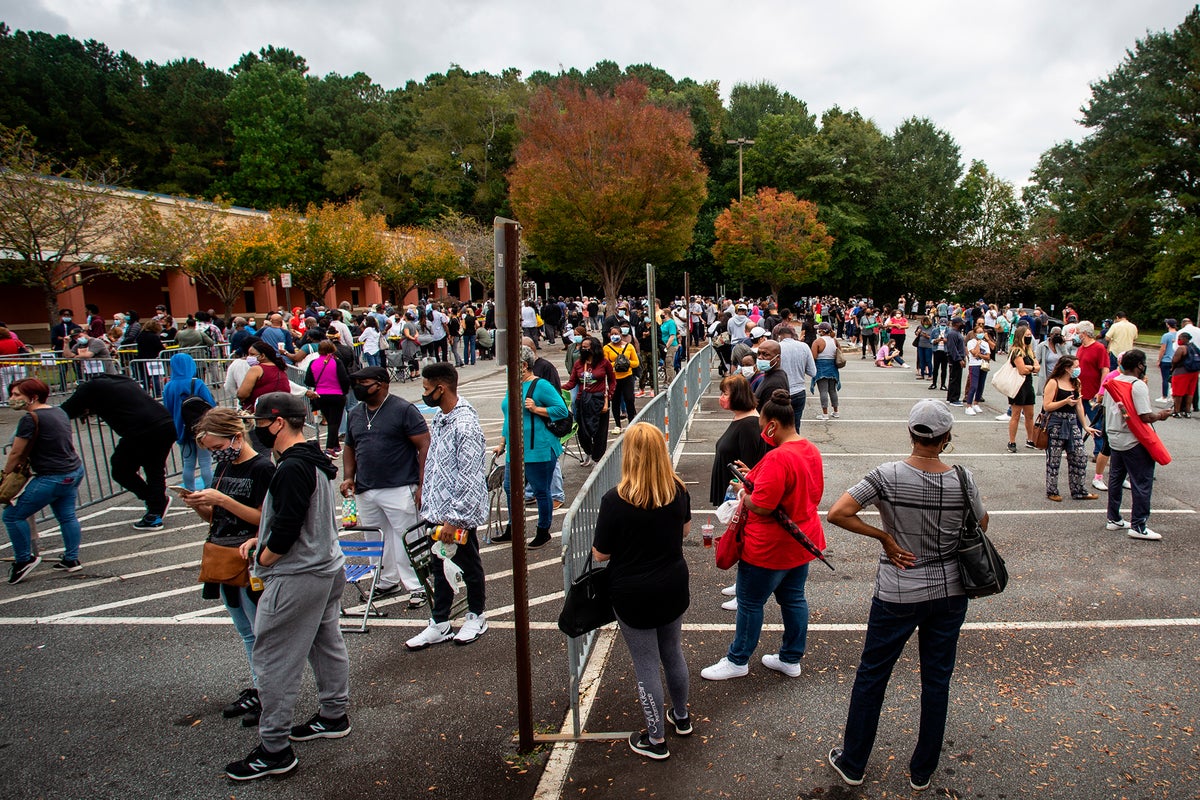
A group of voting rights advocates in Georgia have asked a judge to block enforcement of a measure that outlaws handing out food and water to people standing in line to vote, part of a sweeping election law that has faced widespread criticism and a series of legal challenges from civil rights groups.
Georgia’s Senate Bill 202, a 98-page bill signed into law last year by Georgia’s Republican Governor Brian Kemp, also restricts mail-in ballots, rolls back the availability of ballot drop boxes, and gives greater the state’s GOP-dominated legislature greater electoral oversight, stripping authority from election administrators to place it in the hands of lawmakers.
The law makes it a crime to give out food or water within 150 feet of a polling place or within 25 feet of a person standing in line to vote. Opponents argue that the measure is an attempt to suppress votes in areas more likely to endure longer lines on Election Day.
US District Judge JP Boulee did not immediately rule on the request for a preliminary injunction during a hearing on 18 July.
“When citizens encounter barriers to voting, [plaintiffs] respond with corollary forms of political expression, including, for example, educating voters, encouraging turnout, and honoring the dignity of voters waiting in hours-long polling place lines by offering messages of encouragement and solidarity,” a coalition of voting rights groups and voters wrote in a request for a preliminary injunction last month.
The plaintiffs argued that “these forms of political expression – often conveyed by offering water to the thirsty, sharing food with the hungry, and providing other forms of comfort – are specifically targeted” by the law, which prohibits people from offering “food and drink” to voters within 150 feet of a polling place or within 25 feet of a voter standing in line.
Plaintiffs argue that the ban “effectively silences non-partisan, non-disruptive expressions of support for voters, violating the First Amendment rights of plaintiffs and the voters they serve.”
Mary-Pat Hector, a member of student-run organising group Rise, said in court filings that voters “were physically distressed from standing, unprotected, in the direct sun” during 2020 elections. There also were not enough chairs for elderly voters. Rise volunteers filled up coolers with water and snacks and walked up and down the line to hand them out, which is now illegal under the Georgia law.
Christopher G Johnson, a retired pastor and organiser with Greater Augusta’s Interfaith Coalition, said in court filings the group has given out food and water to people standing in line to vote since 1998, during which he said he has seen people suffer from heat exhaustion, soaked in downpours, or go hungry or thirsty while waiting in hours-long lines. “We only ask one question: Do you want something to eat or drink?” he wrote.
Republican defendants claim that voters complained that groups giving out food and water “felt intimidating” and that the law is necessary to allow people to cast their ballots “freely and without undue interference.”
“Preventing voter fraud, intimidation, and confusion, as well as ensuring efficient elections, are all compelling state interests,” according to attorneys for the state of Georgia “SB 202’s narrow prohibition on giving things of value to voters in the final stages of the voting process – even things of small value like water bottles – clearly furthers those interests.”
But plaintiffs instead have argued that the state should simply enforce existing electioneering laws and other prohibitions on voter intimidation rather than add barriers that make it more difficult for people to cast their ballots.
One filing argues that “preventing improper political pressure and voter intimidation are important interests, but that conduct was already illegal” before the new law.
“Defendants cannot violate plaintiffs’ core First Amendment rights based on a theoretical possibility of already-illegal conduct by differently situated individuals,” according to plaintiffs.
Republican officials and GOP Secretary of State Brad Raffensperger also have argued that Election Day lines have been relatively short despite high turnout under the new law. Opponents warn that the law’s roadblocks will disproportionately impact marginalised voters come November during mid-term elections.
The US Department of Justice has also sued the state to block the law, which Attorney General Merrick Garland alleges was drafted with “the purpose of denying or abridging the right of Black Georgians to vote on account of their race or colour, in violation ... of the Voting Rights Act.”
Democratic members of Congress also sought to add a provision to failed federal voting rights legislation that would ban states from restricting volunteers from handing out food or water to people standing in line to vote.







